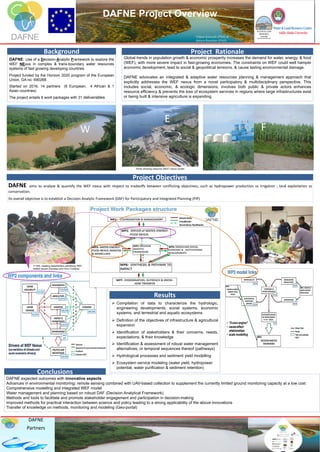Poster DAFNE Project overview
- 1. DAFNE: Use of a Decision-Analytic Framework to explore the WEF NExus in complex & trans-boundary water resources systems of fast growing developing countries Project funded by the Horizon 2020 program of the European Union, GA no. 690268. Started on 2016, 14 partners (6 European, 4 African & 1 Asian countries) The project entails 8 work packages with 31 deliverables Background ’āś Compilation of data to characterize the hydrologic, engineering developments, social systems, economic systems, and terrestrial and aquatic ecosystems ’āś Definition of the objectives of infrastructure & agricultural expansion ’āś Identification of stakeholders & their concerns, needs, expectations, & their knowledge ’āś Identification & assessment of robust water management alternatives, or temporal sequences thereof (pathways) ’āś Hydrological processes and sediment yield modelling ’āś Ecosystem service modeling (water yield, hydropower potential, water purification & sediment retention) Description of Work packages & Deliverables Global trends in population growth & economic prosperity increases the demand for water, energy, & food (WEF), with more severe impact in fast-growing economies. The constraints on WEF could well hamper economic development, lead to social & geopolitical tensions, & cause lasting environmental damage. DAFNE advocates an integrated & adaptive water resources planning & management approach that explicitly addresses the WEF nexus from a novel participatory & multidisciplinary perspective. This includes social, economic, & ecologic dimensions, involves both public & private actors enhances resource efficiency & prevents the loss of ecosystem services in regions where large infrastructures exist or being built & intensive agriculture is expanding. Project Rationale DAFNE expected outcomes with innovative aspects Advances in environmental monitoring: remote sensing combined with UAV-based collection to supplement the currently limited ground monitoring capacity at a low cost Comprehensive modelling and integrated WEF model Water management and planning based on robust DAF (Decision Analytical Framework) Methods and tools to facilitate and promote stakeholder engagement and participation in decision-making Improved methods for practical interaction between science and policy leading to a strong applicability of the above innovations Transfer of knowledge on methods, monitoring and modeling (Geo-portal) Conclusions Results REPLACE THIS BOX WITH YOUR ORGANIZATIONŌĆÖS HIGH RESOLUTION LOGO Swiss federal institute of technology Zurich Politecnico Di Milano (POLIMI) International Centre for Research on the Environment & the Economy- ICRE8 KU Leuven Department of Earth & Environmental Sciences University of Aberdeen. School of Law Institutional Statement University of Osnabrueck. Institute of Environmental Systems Research International Water Management Institute (EWMI) African Collaborative Center for Earth System Science University of Zambia (UNZA) Eduardo Mondlane University VISTA Remote Sensing in Geosciences GMBH ATEC-3D LIMITED European Institute for Participatory Media E.V. Water & Land Resources Centre (WLRC) DAFNE aims to analyze & quantify the WEF nexus with respect to tradeoffs between conflicting objectives, such as hydropower production vs irrigation ; land exploitation vs conservation. Its overall objective is to establish a Decision Analytic Framework (DAF) for Participatory and Integrated Planning (PIP) Project Objectives 1st NSL meeting stakeholders identifying WEF- related issues (Zambezi and Omo Turkana) Photo showing resource (WEF) nexus cluster DAFNE Project Overview Yilikal Anteneh (PhD) & Amare Bantider (PhD) DAFNE Partners W E F FOOD

